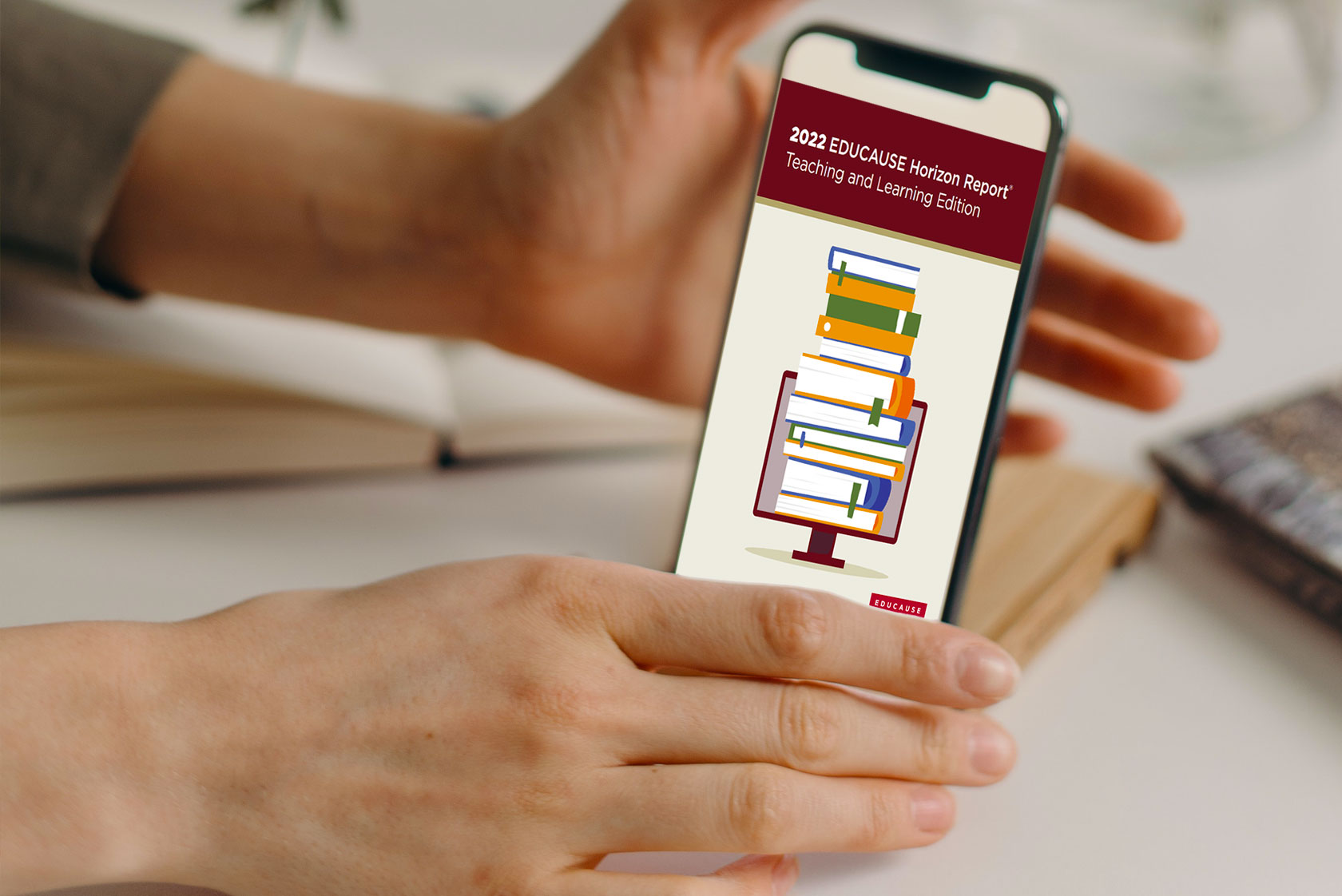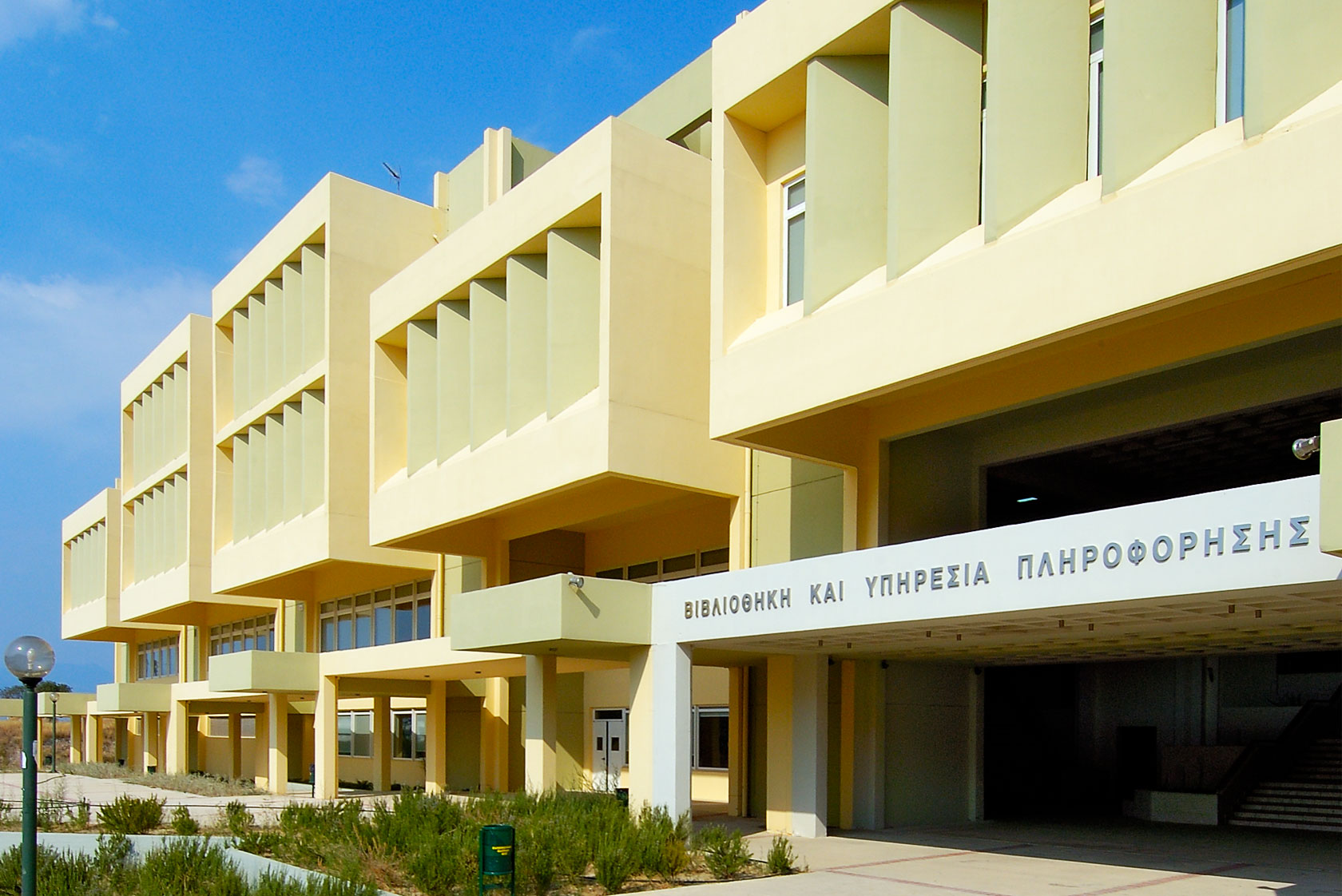
Horizon Report 2022: Trends Such as Hybrid Learning, Micro-certificates and Artificial Intelligence are Gaining Traction
According to the Horizon Report, certain familiar trends from previous years, such as hybrid learning, micro-certificates and artificial intelligence, are gaining traction in the higher education sector. We report on this development, as well as other trends that appear particularly relevant, in our blog post.
by Claudia Sittner and Birgit Fingerle

The 2022 EDUCAUSE Horizon Report Teaching and Learning Edition was published in mid-April 2022. It examines which trends, technologies and practices will have a significant effect on teaching and learning at universities in the future. As with previous editions, the report uses four different scenarios to envision what the future of university education could look like. We outline some of these trends, which could be of interest to academic libraries and information infrastructure facilities.
We outline some of these trends, which could be of interest to academic libraries and information infrastructure facilities.
Hybrid learning: Here to stay
After around two years of the Corona pandemic, most of us are now aware that there will be no return to pre-Corona normality; online and hybrid learning are the new normal. One trend identified by the Horizon Report is a continuation of synchronous and asynchronous learning experiences, coupled with minimal compulsory attendance on campus. According to the Horizon Report (p. 7), this will require “more sustainable and evidence-based models of hybrid and online teaching and learning”. These have now gradually superseded the contingency plans hastily put in place at the start of the pandemic, and will be accompanied by recently developed, reliable hybrid and online education, as well as an investment in additional staff and services. Higher education institutions now have to focus on making sure their students are ready for the online learning experiences. This is certainly an area where academic libraries can also play their part. The new motto is: Education for everyone, from anywhere.
Example: ‘Attend anywhere’ model, Portland, USA
Micro-certificates are winning out over classic university degrees
Lifelong, tailored learning is gaining importance over typical, drawn-out degrees, according to the Horizon Report. Both microcredentialing and online/hybrid education are particularly useful in this regard. That is why libraries and digital infrastructure facilities should be increasingly focussed on more practical, personalised and competence-based courses and micro-certificates, which according to the Horizon Report could potentially provide more attractive options for career advancement than a traditional university education. For example, libraries could think about providing their own courses to make their offers more visible, and thus prevent the big tech companies from dominating the field entirely.
Furthermore, the fact that many people experienced significant financial losses as a result of the pandemic has led them to think more carefully about whether it pays to opt for a typical university degree. Micro-certificates, especially those awarded for free by institutions such as libraries, are thus becoming more attractive.
Read more:
- Open Badges: Meaningful Credential for Continuing Education in Libraries?
- Digital Badges: Clever Proof of Information Literacy
Artificial intelligence: learning analysis and learning tools
Even if it still often gets stuck in the teething stage, the application of artificial intelligence (AI) plays a role in two respects in this year’s Horizon Report: in relation to both learning analysis and learning tools. In relation to learning analysis, institutions would primarily use AI to encourage students’ learning progress based on existing data. When it comes to learning tools it is the students themselves who use them, and are thus able to improve their learning experience at university.
The digital re-orientation brought about by the pandemic has also heralded a flood of digital data. For academic libraries too this means engaging more directly with the potential of the data that has been generated, and ultimately providing their users and staff with an improved learning and working experience.
One challenge in this regard could emerge from the data silos of individual departments, divisions or institutes. These have to be more closely integrated in order to optimise the user experience and encourage operating efficiency. Despite the great potential of AI, there are also some risks to be aware of, such as the fact that AI systems often adopt existing biases and thus favour certain groups of users. This can increase inequalities. What’s more, it is important to clearly communicate what data is being gathered for what purpose, so that users do not lose trust in the institutions.
Read more:
Data trails demand critical engagement with media
In light of growing data volumes, users of infrastructure facilities are leaving more data trails behind them online, whether in the cloud or on social networks. This means it is even more important to equip them with sufficient information literacy and a media-critical mindset, so that they can recognise fake news, dubious conferences and predatory journals, for example. In this regard, academic libraries have a more important role to play than ever when it comes to offering relevant courses and further support.
Strengthening sustainable practices and reducing the ecological footprint
Environmental aspects are also becoming increasingly relevant in how all higher education institutions conduct themselves. It will be a question of them reducing their own ecological footprint on site, and leading by example. Here, libraries can take a look at the permanently altered behaviour brought about by the pandemic, as well as the new demands of users and staff. The ‘Planetary Health Education Framework’ and the 17 Sustainable Development Goals (SDGs) proposed by the United Nations could provide possible points of reference. Is this perhaps a good time for academic libraries to think about how they can become more sustainable and strengthen environmentally friendly practices?
Allegation of political interference
In times of increasing nationalism and populism in some parts of the world, along with global uncertainties, it would be advisable for educational institutions to safeguard their autonomy. However, due to the financing that they require, it is not always possible to withdraw from political matters completely. “In these instances, institutions must be prepared to offer compelling evidence of the benefits of the education and training they provide, as well as to accommodate the needs of increasingly strained and distracted students and families.” (p. 13). In light of increasingly scarce financial resources, more focus could also be afforded to academic libraries in this regard.
This text has been translated from German.
You may also be interested in:
- Top IT Issues, Trends, and Technologies by EDUCAUSE
- Horizon Report 2021: Focus on Hybrid Learning, Microcredentialing and Quality Online Learning
- Horizon Report 2020: AI, XR and OER Begin to Catch on in Higher Education
- Horizon Report 2019: How new Technologies Lead to a Redesign of Learning and Teaching
- Summary EDUCAUSE Horizon Report 2022
- Digital Badges: Clever Proof of Information Literacy
- Study “The University Landscape 2030”: Opening Up Through New Study Models
Birgit Fingerle holds a diploma in economics and business administration and works at ZBW, among others, in the fields innovation management, open innovation, open science and currently in particular with the “Open Economics Guide”. Birgit Fingerle can also be found on LinkedIn.
Portrait, photographer: Northerncards©
Claudia Sittner studied journalism and languages in Hamburg and London. She was a long time lecturer at the ZBW publication Wirtschaftsdienst – a journal for economic policy, and has been the managing editor of the blog ZBW MediaTalk. She is a freelance travel blogger, speaker and author. She can also be found on LinkedIn, Twitter and Xing.
Portrait: Claudia Sittner©
View Comments

Open Access Survey in Greece: Status Quo, Surprising Findings and Starting Points
What is the state of Open Access in Greece? What are the biggest obstacles to Open...



